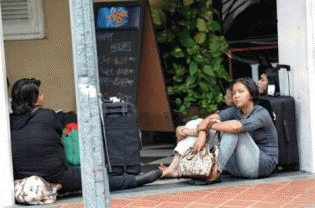Singapore. Singapore may have to scrape the bottom of the barrel to draw
100,000 more foreign maids by 2030 if it does not do anything about work
conditions and match what employers elsewhere are offering.
This is the view of agents,
academics and migrant worker activists, reacting to estimates released in an
occasional paper by the National Population and Talent Division (NPTD) last
week.
There were 208,400 maids in June
this year compared to 198,000 at the end of last year. Most come from Indonesia
and the Philippines.
The experts pointed out that
apart from maids flocking to Taiwan and Hong Kong for better working
conditions, the countries they come from have also made it harder to source for
maids.
The NPTD paper indeed noted that
even if demand goes up, it might not necessarily be met, as the maid supply
could be curbed by growing demand elsewhere.
It estimated Singapore will need
300,000 maids by 2030 based on an expected rise in resident households with
young or elderly members, and those where both spouses work.
Of all resident households with
at least one maid last year, seven in 10 had both spouses working and
three-quarters had young and/or elderly family members.
More elderly, non-working
households are also hiring — 12 percent of such households had maids last year,
up from 6 percent in 2000.
Agents said the opening up of new
sources for maids such as Cambodia can help meet some of the demand.
But they foresee that Indonesia
and the Philippines will remain as top draws because their citizens have a
relatively stronger command of English.
But maids from Indonesia and the
Philippines are similarly coveted in Hong Kong and Taiwan where monthly salaries
of S$700 (US$570) to S$850 (US$693) are almost double the S$450 (US$367) which
most maids here get.
Singapore has to act fast to
improve the lot of maids or it will be viewed as a "stepping stone to
greener pastures," said Bridget Tan, chief executive of migrant workers
rights group Humanitarian Organization for Migration Economics (Home). Maids
can use their stints here to hone English and work skills.
Noorashikin Abdul Rahman,
vice-president of migrant workers group Transient Workers Count Too, said that
Singapore can fight back by raising maid salaries. She added that an effective
way is to have a minimum wage of $600 (US$489).
Maids in Hong Kong are guaranteed
a minimum HK$3,920 (US$505) a month, with at least one day off a week.
Maids' pay in Singapore is linked
to market forces and individual employers and maids, with some earning less
than the market rate of US$367.
Noorashikin said employment
contracts in Singapore do not spell out maid responsibilities clearly and this
makes it difficult for them to get paid more.
"It is only right that they
are paid extra if they are hired to perform caregiver tasks but end up also
doing domestic work," she added.
If Singapore has trouble
attracting maids, some point out that harnessing technology is another option.
Orange Employment Agency owner
Shirley Ng suggested Singapore develop robots which can do household chores,
and build high-tech retirement villages wired with online alarm systems which
residents can sound when they need help.
Ultimately though, the employment
rights of maids need to be improved, the experts said, as maids will go to
countries which respect them as individuals.
Unlike Singapore, maids in Hong
Kong are covered by labor laws assuring them of a weekly rest day, public
holidays and maternity leave.
Professor Kayoko Ueno, who has
studied domestic workers for a decade, said her interviews with maids here
reveal that their bosses do not take giving them weekly days off seriously.
"Employers in Hong Kong
won't let their domestic workers do even 10 minutes of housework on their days
off. But domestic workers in Singapore tell me that their employers will ask
them to do half a day of work before they rest," she said.
Prof Ueno, who teaches at the
University of Tokushima in Japan, noted, however, that Singapore is moving in
the right direction by introducing a compulsory weekly day off policy from Jan
1.
Home's Tan said: "We need to
look at social support services like recreational facilities which they can use
on rest days and also training courses to help them carve out better futures
when they return home."
Amelia Tan
Reprinted courtesy of The Straits
Times
Business & Investment Opportunities
YourVietnamExpert is a division of Saigon Business Corporation Pte Ltd (SBC), Incorporated in Singapore since 1994. As Your Business Companion, we propose a range of services in Strategy, Investment and Management, focusing Healthcare and Life Science with expertise in ASEAN. Since we are currently changing the platform of www.yourvietnamexpert.com, if any request, please, contact directly Dr Christian SIODMAK, business strategist, owner and CEO of SBC at christian.siodmak@gmail.com. Many thanks.

No comments:
Post a Comment